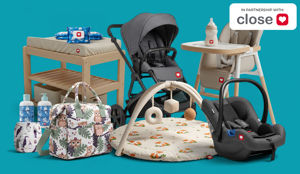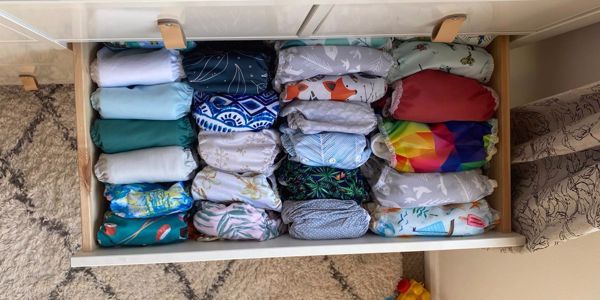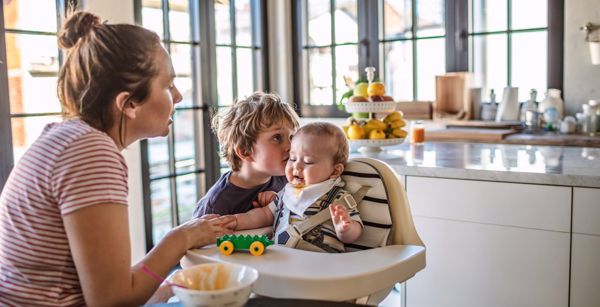When I was a new mum I was oblivious to so many of the medical aspects of having a tiny human to take care of. So much of it is common sense and you are just winging it at the start, following your instincts when they cry or are unwell. Most babies cry for a reason and over time those cries can be distinguished by their parents for hunger or tiredness etcetera. But what if you had tried everything you could think of, and yet your baby was still inconsolable? This is what happened to me, and this is my story about how you can tell if your baby has signs of allergies. It’s my hope that my story can help other parents who may be unaware of what to look out for, because despite it being common, there seems to be very little information about allergies in babies.
There are obvious key things that you watch out for in a young baby like being sick, cries of pain, various types of rashes, and any blood that is coming from where it shouldn’t be. Our son was jaundice only hours after birth and I spent a great many weeks in hospital with him at the start, by his side throughout, feeding and pumping and giving all that I had to make him well again. Then there were many follow up appointments that followed. Just when I thought all the medical stuff was over and we were settled at home, things became bad again. He and I had both worked hard day and night to establish a breastfeeding routine and we had developed a close bond. But he began having strange nappies, moments of sleep where he would cry out as if in pain. He would lift his legs up and thrash his tiny body around in his basket. It was a worrying time for me and I didn’t understand what was wrong.
The signs that your baby has an allergy can be varied depending on the allergy in question and it will also differ from child to child. When I was changing my son’s nappy at around ten weeks old I noticed a streak of blood within his stool, and it happened again when I wiped him. He also had a bottom rash that became sorer and sorer. My heart was in my throat as I cleaned him up, the one thing you always watch out for is blood and I found out later that in little ones it’s usually found in their stool. I barely slept that night worrying about him and I dreaded every nappy change. Throughout the night I monitored him and he was still crying out in pain, but otherwise, he was well, no temperature or anything like that.
Contacting the GP early the next morning I was relieved to have their support straight away. She suggested it was most likely to be a reaction to dairy and that baby A was having a hard time with the digestion of any dairy proteins coming through my breast milk. We were referred to our local hospital to see a paediatrician and child allergy consultant, but it could be a couple of weeks. She warned me not to change my diet until we had seen the expert, but to instead write a food and nappy diary to show the consultant. I was methodical and made sure that I documented everything. It was my way of coping with the stress of worrying as well.
Baby A had begun with eczema after his first set of injections and this was another reason the doctors thought he may have some food allergies. It started on his face and arms and then quickly spread to other areas of his body such as his legs and any creases where he may sweat. When we eventually saw the Consultant they explained that sometimes allergies occur side by side with things such as Eczema rashes and other skin problems. It was difficult to swallow and I did feel some guilt at first, the doctor reassured me that it was something he could possibly grow out of, or he could have for life. I just wanted to make him better and would do anything. With that statement from me, they said my diet had to change immediately in order for us to continue breastfeeding, but I was adamant that was what I wanted to do. Looking back now I definitely made the right decision for me and my son. Breastfeeding has helped him to become a healthy toddler now because he hasn’t missed out on anything; we have simply gotten the missing vitamins and minerals from other means, things usually with added calcium in for example.
Once I had changed to a dairy-free diet we saw a huge improvement in Baby A. He had less wind and less abdominal issues, he actually wanted to try and roll over on his own again, tummy time was no longer an issue where he had shown reluctance to do so before. Then as the weeks went on the eczema and dry skin slowly began to improve too, with the help of some prescribed creams from the Hospital and GP as well. It was like Baby A was finally happy in his own skin, we got a lot more smiles from him, he even slept a little better (still woke frequently for his boobie milk of course) but he no longer wriggled out of discomfort that he once had done so often in his basket.
It took around three months before his eczema became under control. When he got to the next set of injections he still had around twenty per cent of his body that was affected by it.
We were advised by our doctor to get Baby A allergy tested as soon as possible after weaning, but our hospital only did this after a child has turned one year of age, so we would have to request a referral back to them in order to begin the allergy testing. We decided to continue breastfeeding, we relied on it so much to keep him hydrated and healthy, he was getting everything he needed from me. He even went up on the centile graph when we saw the health visitor. After his slow start at birth with his jaundice and growth, I was so happy to see some improvements. I felt like I had done the best for him in the circumstances I had been dealt, and we were now coping well with all the changes we had to implement into our lives.
I was also advised to wean him after he got to six months of age and only when he seemed to take an interest in foods. I started on a puree of vegetables and then fruit. I had to still keep a food diary and monitor his eating habits closely. Documenting any changes in his skin or in his stool was important, and making sure that he was well fed of course. We were told by the consultant what to look out for. I was only ever trying to give him things that I knew weren’t going to cause any upset. Whenever he was sick within moments of eating something I knew it could be an allergy-related sickness, so I made a note of what he had eaten and didn’t give him it a second time. All of this was in preparation for when he would be old enough to be allergy tested. The months of waiting seemed to go on forever, and apart from the foods he was allergic to, he became very good with food and eating in general.
Here is a list of the things you should look out for if you believe your baby could be having an allergic reaction to something. These can vary in severity, our son was breastfed, but babies who are formula-fed can react differently. Some experience more sickness during bottle-feeding for example, I believe it’s because breastfed babies digest the breast milk faster and easier than if it were a formula. There is more information on the NHS website and of course, you could phone your local doctors for advice too. If it is a serious reaction with shortness of breath you can phone for an ambulance.
SIGNS YOUR BABY COULD HAVE AN ALLERGY
*Eczema or other skin problems such as contact dermatitis, this includes sore and red skin, usually in patches not all over, sudden dry and itchy skin.
*Red Eyes, Watering Eyes and Rubbing their Eyes which usually mean they are Itchy.
*A Blocked Nose, Running Nose, Sneezing and Swollen Nasal Passages.
*Wheezing, Coughing and a Shortness of Breath.
*Swollen Eyes, Lips, Tongue or Face in general.
*Hives or a Similar Raised Itchy Rash.
*Diarrhoea
*Nausea and a reluctance to consume the food they might be allergic to.
*Blood in their stool
*Thrashing around of their body due to pain and / or discomfort
*Poor feeding and prolonged crying and / or issues during a feed
*Sickness that becomes more frequent after consuming the product.
*Sickness moments after consuming something in order to remove it from the body.
If you ever notice any of these symptoms and your baby has changed its behaviour and routine (sometimes these changes can occur suddenly), then seek medical advice.
We were advised to carry Piriton, an antihistamine based liquid so that Baby A could be given some in the event of a new bad reaction. It’s advisable to take a note of what was consumed and what happened that day so that you could tell the medical professionals.
We are currently going through a range of allergy testing, and it turned out that Baby A didn’t just have a dairy intolerance; it was milk and a lot more foods besides. But we are grateful to the NHS doctors and nurses for their continued support in researching and testing with us to find out the severity of his conditions and how we can make the various food and milk alternatives work for us.
If your baby is showing symptoms of allergies no matter how small then please contact your local doctor and get them seen as soon as it is safely possible to do so. Lots of babies grow out of allergies and we are optimistic that this may happen for us, he has a long way to go and it could take years if he will, in fact, grow out of them. If not, then I have already altered my entire diet for my babies best interest, and I would do it all again if I had to. As Baby A’s mummy, I would do anything for him to be happy and healthy.






